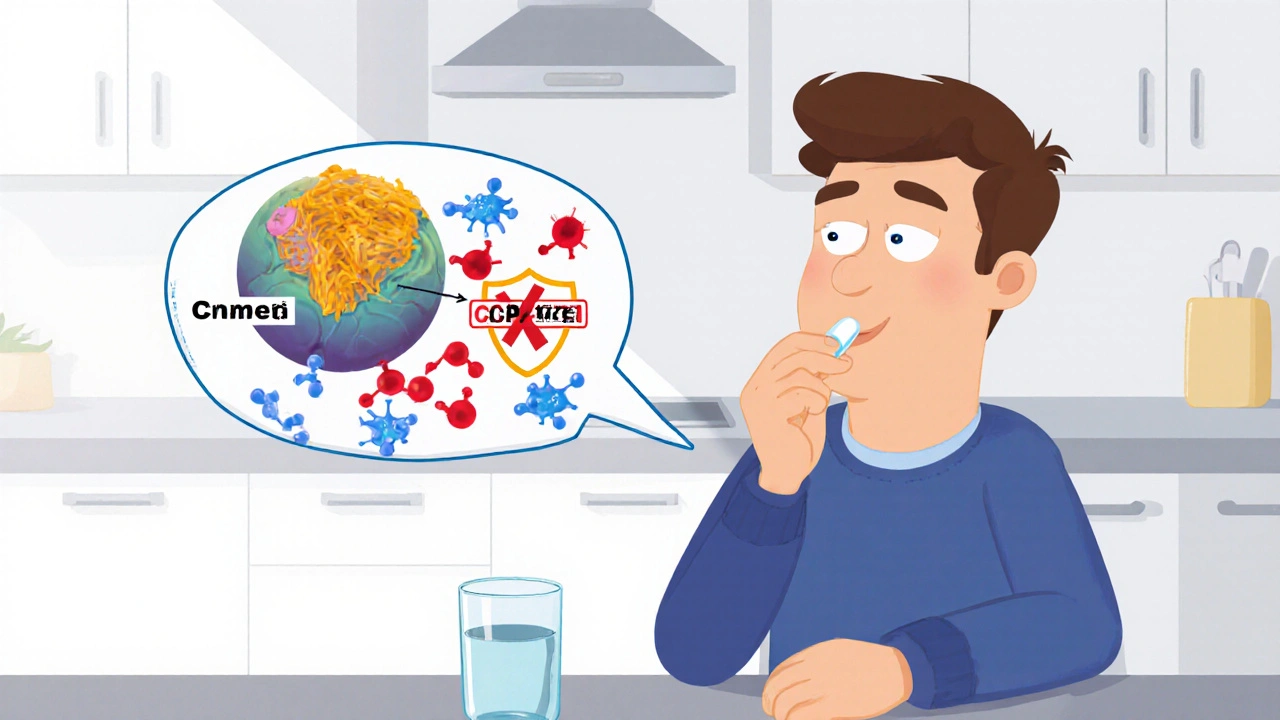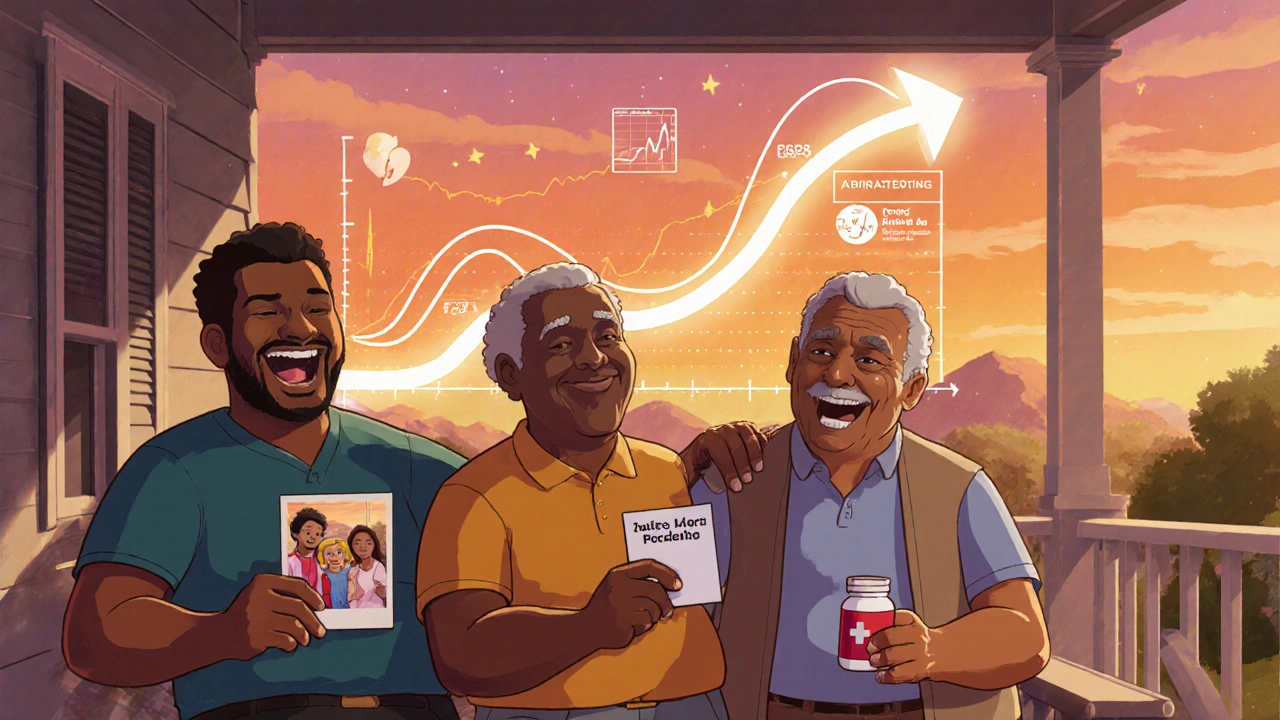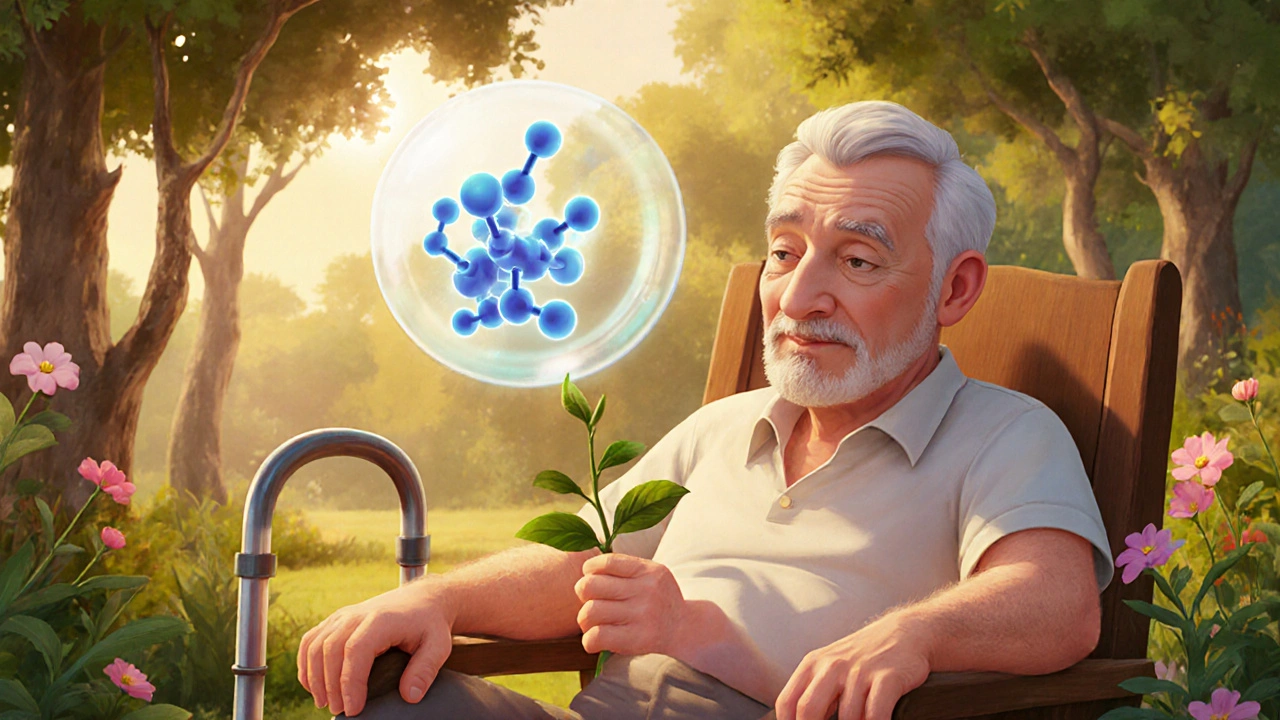When prostate cancer stops responding to standard hormone therapy, options used to be limited. Many men faced a grim choice: endure worsening symptoms or try harsh chemotherapy with little guarantee of success. Then came abiraterone - a drug that didn’t just slow the disease, but gave men back months, sometimes years, of meaningful life. Today, it’s a cornerstone in treating advanced prostate cancer, especially when the cancer has become resistant to earlier treatments.
What abiraterone actually does
Abiraterone isn’t a chemotherapy drug. It doesn’t kill cancer cells directly. Instead, it cuts off the fuel that makes those cells grow. Prostate cancer often feeds on testosterone and other androgens. Even after surgical or medical castration - which lowers testosterone from the testicles - the cancer can still make its own hormones in places like the adrenal glands and even inside the tumor itself. That’s why many men relapse.
Abiraterone blocks an enzyme called CYP17A1. This enzyme is critical for making androgens in the body. By shutting it down, abiraterone reduces testosterone and other male hormones by up to 95% - even in places that other treatments can’t reach. The result? Tumors shrink. PSA levels drop. Symptoms like bone pain and fatigue improve.
The active form of the drug is abiraterone acetate. It’s taken as a pill, once a day, on an empty stomach. You can’t eat for two hours before and one hour after taking it. That’s because food changes how the body absorbs it. Skipping this rule can make the drug less effective - or worse, increase side effects.
Who benefits most from abiraterone
Abiraterone is approved for two main groups:
- Men with metastatic castration-resistant prostate cancer (mCRPC) - cancer that has spread beyond the prostate and no longer responds to hormone therapy.
- Men with high-risk metastatic hormone-sensitive prostate cancer (mHSPC) - meaning the cancer has spread but still responds to hormone therapy. In this group, adding abiraterone early improves survival more than hormone therapy alone.
Studies show that men with mCRPC who take abiraterone plus prednisone live about 15 months longer on average than those on placebo. For men with mHSPC, the survival benefit is even more dramatic - nearly 40% reduction in the risk of death over five years. These aren’t small gains. They’re life-changing.
It’s not just about living longer. Many men report better quality of life. Less pain. Fewer hospital visits. More time with family. That’s why guidelines from the American Society of Clinical Oncology and the European Association of Urology now recommend abiraterone as a first-line option for many men with advanced disease.
How it’s used with prednisone
Abiraterone doesn’t work alone. It’s always taken with a low dose of prednisone - usually 5 mg once or twice daily. Why?
When you block androgen production with abiraterone, your body compensates by overproducing another hormone: ACTH. That pushes your adrenal glands to make more mineralocorticoids, which can cause high blood pressure, low potassium, and fluid retention. Prednisone suppresses this reaction. Without it, you risk serious side effects like heart rhythm problems or swelling in the legs.
It’s not optional. Skipping prednisone isn’t just risky - it’s dangerous. Doctors monitor blood pressure and potassium levels regularly. If levels drop too low, they adjust the prednisone dose. This combo isn’t complicated, but it’s precise. Getting it right matters.

Side effects you should know about
Abiraterone is generally well-tolerated, but it’s not side-effect-free. The most common ones include:
- High blood pressure (affects about 30% of users)
- Low potassium levels (seen in 20-25%)
- Fluid retention (swelling in ankles or feet)
- Fatigue
- Joint and muscle pain
- Hot flashes
Less common but more serious risks include liver problems. About 1 in 20 men show elevated liver enzymes. That’s why blood tests are done monthly for the first three months, then every few months after. If liver values jump too high, doctors pause the drug and retest. Most cases reverse once abiraterone is stopped.
Some men experience adrenal insufficiency - especially if they’re stressed, sick, or have surgery. That’s why patients are told to carry a medical alert card and know the signs: dizziness, nausea, confusion, or extreme weakness. In emergencies, they may need extra steroids.
It’s not a drug you take lightly. But for most men, the benefits far outweigh the risks. And with careful monitoring, side effects are manageable.
How abiraterone compares to other treatments
There are other options for advanced prostate cancer. Enzalutamide is another hormone-targeting drug that works similarly - it blocks testosterone from binding to cancer cells. Apalutamide and darolutamide are newer drugs in the same class. Chemotherapy like docetaxel is still used, especially if hormone drugs stop working.
So how does abiraterone stack up?
| Treatment | How it works | Common side effects | Administration | Survival benefit in mCRPC |
|---|---|---|---|---|
| Abiraterone + prednisone | Blocks androgen production | High BP, low potassium, fatigue | Oral pill, empty stomach | ~15 months longer |
| Enzalutamide | Blocks testosterone from binding to cells | Fatigue, seizures (rare), dizziness | Oral pill, any time | ~14 months longer |
| Docetaxel (chemo) | Kills rapidly dividing cells | Hair loss, nausea, low blood counts | IV infusion every 3 weeks | ~10 months longer |
Abiraterone stands out because it’s oral, doesn’t cause hair loss or severe nausea, and has a strong survival benefit even before chemotherapy is needed. Enzalutamide is close in effectiveness, but it carries a small risk of seizures - something abiraterone doesn’t have. That makes abiraterone the preferred choice for many men, especially those who want to avoid chemo for as long as possible.

Real-world impact: Stories behind the data
One patient in Auckland, 68, was told his cancer had spread to his spine. His PSA was over 200. He couldn’t walk without pain. After starting abiraterone and prednisone, his PSA dropped to 12 within three months. Within six months, he was gardening again. He didn’t get cured - but he got back his life.
Another man in Christchurch, 72, started abiraterone right after diagnosis because his cancer was already metastatic. Five years later, he’s still on it. His PSA remains stable. He travels with his wife. He watches his grandchildren grow. These aren’t outliers. They’re the new normal.
Before abiraterone, men like these would have been expected to die within two years. Now, many live five, six, or more. That’s the real breakthrough.
What’s next for abiraterone
Research is ongoing. Scientists are testing abiraterone in earlier stages - even for men with localized high-risk prostate cancer, before it spreads. Early results suggest it might prevent metastasis in some cases.
Combination therapies are also being studied. Abiraterone with PARP inhibitors (like olaparib) for men with specific genetic mutations (BRCA1/2) shows promise. Trials are also looking at combining it with immunotherapy or radiopharmaceuticals like lutetium-177.
Cost remains a barrier in some countries. Generic versions are now available in the U.S. and parts of Europe, but in New Zealand and Australia, they’re still expensive without subsidy. Access isn’t universal - but it’s improving.
One thing is clear: abiraterone didn’t just add another option to the toolbox. It rewrote the playbook for advanced prostate cancer. It turned a terminal diagnosis into a manageable condition for thousands.
Is abiraterone a chemotherapy drug?
No, abiraterone is not chemotherapy. It’s a hormone therapy that blocks the body’s production of androgens like testosterone. Chemotherapy kills fast-growing cells, while abiraterone starves cancer cells of the hormones they need to grow.
Can you take abiraterone without prednisone?
No. Abiraterone must always be taken with low-dose prednisone. Without it, your body may overproduce other hormones that cause dangerous side effects like high blood pressure, low potassium, and fluid retention. Skipping prednisone is not safe.
How long do people stay on abiraterone?
Most men stay on abiraterone as long as it continues to work and side effects are manageable. Some stay on it for years. Treatment stops if the cancer starts growing again, if side effects become too severe, or if a doctor recommends switching to another therapy.
Does abiraterone cause weight gain?
Abiraterone itself doesn’t directly cause weight gain. But fluid retention from the drug - or from prednisone - can lead to swelling in the legs or abdomen, which may feel like weight gain. This is usually temporary and improves with dose adjustments or diuretics if needed.
Can abiraterone cure prostate cancer?
Abiraterone does not cure prostate cancer. It controls the disease, slows its progression, and extends life - often by years. For many men, it turns advanced prostate cancer into a chronic condition, not a death sentence.
Final thoughts
Abiraterone changed the game. Before it, men with advanced prostate cancer had few good options. Now, they have time - time to travel, to see grandchildren graduate, to sit on the porch with a cup of tea. It’s not perfect. It requires discipline, monitoring, and patience. But for thousands, it’s the difference between dying and living.
If you or someone you know is facing advanced prostate cancer, ask about abiraterone. Not as a last resort - but as a powerful, proven option that deserves to be considered early. The science is clear. The results are real. And for many, it’s the best thing that ever happened to them after diagnosis.


Sean Nhung
November 1, 2025 AT 05:02This is such a game-changer. I’ve seen family members go through chemo and it’s brutal. Abiraterone giving people back their daily life? Huge win. 🙌
thilagavathi raj
November 2, 2025 AT 06:06ABIRATERONE ISN’T CHEMOTHERAPY?!? I’ve been telling everyone this for YEARS. The medical system is so lazy with terminology. This is why people panic. 🚨
Diane Thompson
November 3, 2025 AT 16:59Wow, another drug that needs a pill schedule like a NASA launch. Just give me the chemo, I’ll take the hair loss. At least I know what I’m getting.
Saloni Khobragade
November 4, 2025 AT 06:29How can anyone think this is acceptable? People are dying because they can’t afford this drug while pharma CEOs buy yachts. This isn’t medicine, it’s exploitation. And why is prednisone even needed? Someone’s profit margin is hiding here.
My cousin’s neighbor’s brother died waiting for insurance approval. He was 56. This isn’t science, it’s capitalism with a stethoscope.
And don’t even get me started on the ‘empty stomach’ rule. What if you’re diabetic? Or elderly? Who designed this? A robot?
They say ‘it’s manageable’-but manageable for whom? For people with good healthcare, good income, good luck. For the rest of us? We just wait.
I’m not mad, I’m just disappointed. We’re talking about extending life, not making it a logistical nightmare.
Why aren’t we pushing for universal access? Why are we still arguing about ‘cost-effectiveness’ while people cry in waiting rooms?
It’s not about ‘benefits outweighing risks’-it’s about whether we care enough to make it available to everyone who needs it.
And yes, I know I’m being dramatic. But when your life depends on a pill you can’t afford, drama is the only language left.
Sandridge Neal
November 4, 2025 AT 13:07Thank you for writing such a clear, compassionate overview. This is exactly the kind of information that empowers patients and families. I’ve shared this with my prostate cancer support group-everyone was moved by the real-world stories.
It’s easy to get lost in the science, but the part about the man gardening again? That’s the real metric. Quality of life matters as much as longevity.
Keep spreading awareness. This isn’t just medicine-it’s dignity.
Helen Moravszky
November 6, 2025 AT 09:40OMG I just read this and cried a little 😭 I’m so glad someone finally explained abiraterone like a human. My dad’s on it and I kept mixing it up with chemo. Now I finally get why he can’t eat right after taking it. Also, the prednisone thing? YES. We almost skipped it because the doctor didn’t emphasize it enough. Thank you for the warning!!
Also, the part about the PSA dropping to 12? That’s our story too. He went from wheelchairs to walking the dog. I’m so grateful.
Mitch Baumann
November 8, 2025 AT 02:41Interesting… though I must say, the data presented here lacks proper citation of phase III trials-specifically, the COU-AA-302 and LATITUDE studies. Without referencing the hazard ratios and confidence intervals, this reads more like a press release than a clinical summary. Also, the table is aesthetically unpolished-no borders, inconsistent alignment. A shame.
And while abiraterone is indeed a milestone, one must acknowledge that enzalutamide has demonstrated superior CNS penetration in preclinical models-something this article entirely omits. 🤔
Vivek Mishra
November 8, 2025 AT 09:36It’s just another pill. Stop acting like it’s magic.
ridar aeen
November 9, 2025 AT 23:46Abiraterone? Sounds like a brand name made by a marketing team who read a textbook for five minutes. Real medicine doesn’t need fancy words.
chantall meyer
November 10, 2025 AT 08:18Let’s be honest. This drug works because it’s expensive. If it were cheap, they wouldn’t have pushed it so hard. The real breakthrough? Profit margins.
Samuel Wood
November 11, 2025 AT 23:31Abiraterone? I thought that was a type of yoga. LOL. Jk. But seriously, why does it need prednisone? Sounds like they’re patching one problem with another. Like putting duct tape on a leaking pipe.
Debra Callaghan
November 13, 2025 AT 15:28Why are we still letting Big Pharma control treatment options? This drug costs $10,000 a month in the U.S. That’s not healthcare-that’s robbery. And they want us to be grateful? No. We deserve better.
kat pur
November 15, 2025 AT 06:08I appreciate how this breaks down the science without jargon. My mom is on this now, and I finally understand why she gets so tired and why her blood tests matter so much. Thank you for writing this with such care.
Also, the part about the man in Christchurch? That’s my uncle. He’s been on it for six years now. Still travels. Still cooks Sunday dinners. That’s the real win.
Reginald Matthews
November 15, 2025 AT 14:08Thanks for sharing the real stories. The data is important, but the man gardening again? That’s what sticks with you. I work in oncology and I see how much this changes families-not just survival numbers, but birthdays, graduations, quiet mornings. It’s profound.